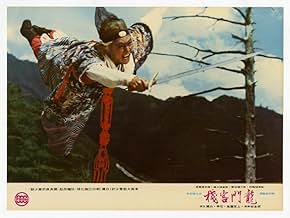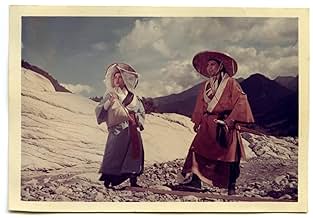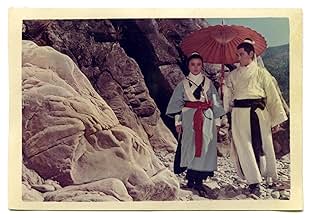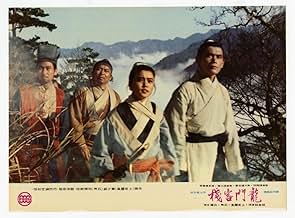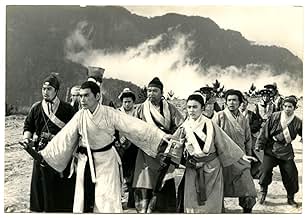When the children of an executed General are pursued in 1457 China, some heroic martial arts swordsmen intervene.When the children of an executed General are pursued in 1457 China, some heroic martial arts swordsmen intervene.When the children of an executed General are pursued in 1457 China, some heroic martial arts swordsmen intervene.
- Awards
- 1 win & 1 nomination total
- Director
- Writer
- All cast & crew
- Production, box office & more at IMDbPro
Featured reviews
This film takes place during the Ming Dynasty with a powerful government official named "Cao" (Bai Ying) in the act of executing one of his main rivals so that he can secure even more power for himself. Having accomplished that, he then orders his elite agents to track down and kill his rival's two children as well. Fortunately, once word of the order is leaked, a small number of soldiers loyal to their previous master take the two children and flee on foot into the desert to escape those in hot pursuit. Upon then being apprised of this development, Cao subsequently orders some of his men to outflank them on horseback to a tavern known as the Dragon Inn. Once there, however, the agents at the Dragon Inn are surprised when a swordsman named "Xiao Shaozi" (Chun Shih) suddenly arrives and creates problems for all of them. Now, rather than reveal any more, I will just say that this is one of those movies which features quite a bit of sword fighting and martial arts--which should please viewers who enjoy action films of this sort. And while I would have preferred a movie with a bit more drama and suspense, I thought it passed the time well enough, and I have rated it accordingly. Slightly above average.
10wataru-7
There are some movies that stick by you over the years and this Chinese swords movie from the middle sixties is one of them.
King Hu's Dragon Gate Inn has all the ingredients in it to make this movie a classic. Not only does it have good swords fights and combines these with an excellent story and plot but on a more subtle level the background music adds a really good atmosphere to it that draws you even more into the movie and story.
I can recommend this movie for anyone who is interested in Chinese film in general and anyone who is interested in Chinese swords movies with a good story and plot.
10 out of 10 points from me.
King Hu's Dragon Gate Inn has all the ingredients in it to make this movie a classic. Not only does it have good swords fights and combines these with an excellent story and plot but on a more subtle level the background music adds a really good atmosphere to it that draws you even more into the movie and story.
I can recommend this movie for anyone who is interested in Chinese film in general and anyone who is interested in Chinese swords movies with a good story and plot.
10 out of 10 points from me.
I saw this film in the 60's, and have yet to find one to beat it. 'Hidden Dragon, Crouching Tiger' has to come in behind this masterpiece. The use of new actors and actresses, the adoption of well-timed traditional Chinese music, e.g. to usher in the villain, the innovative action sequence in sword fights, all added to the brilliance of this film.
Yes, there are shortcomings. Toward the end, and the climax, the anti-gravity leaps to the trees were overdone and unnecessary. Regardless, this film resembles the best of the traditional, addictive Chinese martial art novels that once consumed many hours of the armchair martial art addicts.
Yes, there are shortcomings. Toward the end, and the climax, the anti-gravity leaps to the trees were overdone and unnecessary. Regardless, this film resembles the best of the traditional, addictive Chinese martial art novels that once consumed many hours of the armchair martial art addicts.
I speculate that King Hu must have left Shaw Brothers with a bad taste in his mouth after doing "Come Drink With Me". "Come Drink with Me" is also one of the greatest martial arts movies despite having room for improvement. This movie feels to me like King Hu made those improvements in it. I consider this his is his masterpiece. I compare it to the movies of Akira Kurosawa. Too bad that King Hu was nowhere near as prolific. This movie could even be considered his one hit wonder.
King Hu seemed to realize the claustrophobic situation of of the good guys and bad guys face to face in the Dragon Inn was great drama but it had to be contrasted with as much wide open space as possible. In "Dragon Inn" most scenes outside the inn are shot in expansive panoramas. Like Kurosawa, King Hu appreciated the way moving the camera brought the audience into the scene. He used tracking shots, particularly during fight sequences, to get this feeling.
Hang Ying-Chieh gets credit as action coordinator. He was the Big Boss in Bruce Lee's "The Big Boss". Remember when Bruce is cut, wipes off his blood then tastes it? Hang Ying-Chieh does the same here. The sword fights are Japanese style - starting with a suspenseful face off, then a sudden attack to cover the distance, just a few quick strokes of action, then stop and wait a few seconds to feel the results. A real sword cut is initially almost painless so the person cut doesn't know until he sees the effect of the cut.
I rate this as one of the best of 1967 and I recommend it to everyone - not just fans of the genre - to everyone.
King Hu seemed to realize the claustrophobic situation of of the good guys and bad guys face to face in the Dragon Inn was great drama but it had to be contrasted with as much wide open space as possible. In "Dragon Inn" most scenes outside the inn are shot in expansive panoramas. Like Kurosawa, King Hu appreciated the way moving the camera brought the audience into the scene. He used tracking shots, particularly during fight sequences, to get this feeling.
Hang Ying-Chieh gets credit as action coordinator. He was the Big Boss in Bruce Lee's "The Big Boss". Remember when Bruce is cut, wipes off his blood then tastes it? Hang Ying-Chieh does the same here. The sword fights are Japanese style - starting with a suspenseful face off, then a sudden attack to cover the distance, just a few quick strokes of action, then stop and wait a few seconds to feel the results. A real sword cut is initially almost painless so the person cut doesn't know until he sees the effect of the cut.
I rate this as one of the best of 1967 and I recommend it to everyone - not just fans of the genre - to everyone.
This is the original of the 1992 remake of the same title(with a NEW) and 2nd of the "INN" trilogy by King Hu after Come Drink With Me. It was a major hit all over Chinese areas in South East Asia and discovered Shang Kuan Ling Feng(note the mistake by a previous comment)as the 2nd most popular Sword woman(the 1st was Cheng Pei Pei, and later 3rd Hsu Feng(Hsia Nu aka A Touch of Zen). All these 3 females stars are made popular by him and they are also the 3 most popular swords women in Chinese Cinema.
If there is any complaint by any viewer, it's the pace that many may find it a bit slow but isn't most highly regarded movies slow ?? The finale scene is the most climatic in a Chinese action that critc compared this film to "Rio Bravo" and "The Wild Bunch".
Beware of some mistakes in the original English subtitles mentioned by the director himself.
You can watch some scenes of it if you go to the movie Bu San(2003) aka Goodbye, Dragon Inn(here in IMDb and watch the trailer) which paid tribute to this movie.
The 90's remake is nothing better except for an additional character well acted by Maggie Cheung.
If there is any complaint by any viewer, it's the pace that many may find it a bit slow but isn't most highly regarded movies slow ?? The finale scene is the most climatic in a Chinese action that critc compared this film to "Rio Bravo" and "The Wild Bunch".
Beware of some mistakes in the original English subtitles mentioned by the director himself.
You can watch some scenes of it if you go to the movie Bu San(2003) aka Goodbye, Dragon Inn(here in IMDb and watch the trailer) which paid tribute to this movie.
The 90's remake is nothing better except for an additional character well acted by Maggie Cheung.
Did you know
- TriviaDirector King Hu encouraged his martial arts choreographers to draw from the alternately fluid and rhythmic movements of Chinese opera. Rather than resorting to fast or slow motion, footage printed backward, animation, or other early special-effects techniques, the filmmaker relied as much as possible on the actual skills of his performers and on the magic of editing.
- ConnectionsFeatured in Goodbye, Dragon Inn (2003)
- How long is Dragon Inn?Powered by Alexa
Details
- Release date
- Countries of origin
- Language
- Also known as
- Die Herberge zum Drachentor
- Filming locations
- Production company
- See more company credits at IMDbPro
Contribute to this page
Suggest an edit or add missing content


